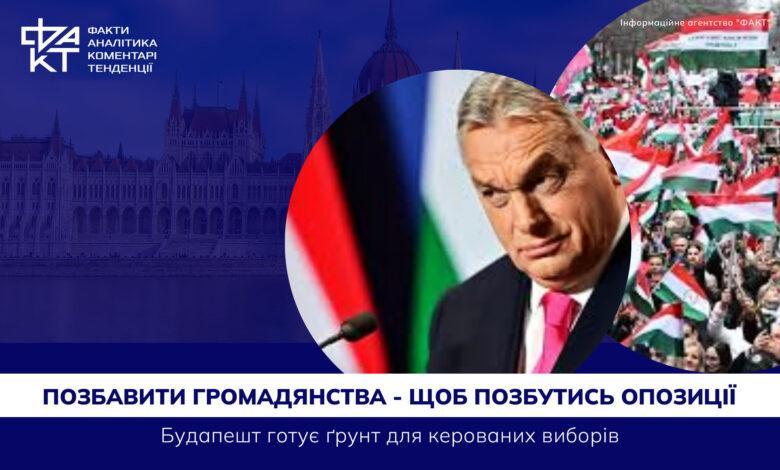Register of citizens’ accounts: the first step towards digital transparency or a new tool for surveillance? (continued)

Hungary is at risk of becoming the first country in the European Union, which will legally allow itself to deprive its own citizens of citizenship – not for criminal offenses, but for political beliefs. The new draft law, adopted by the ruling Fidesz party, allows to temporarily suspend the citizenship of persons with dual citizenship if the authorities recognize that they are “acting in the interests of foreign countries” or “undermining the sovereignty of Hungary”.
Despite the formal reference to national security considerations, the essence of the initiative is obvious: the law is directed against journalists, activists and representatives of civil society — both inside the country and outside its borders. It is a new attempt to silence those who disagree with Viktor Orbán’s political course, who criticize his authoritarian style of governance and the country’s international isolation.
Challenges for the EU: how to respond to Budapest’s policies
The new draft law is not an isolated episode, but part of a large-scale campaign to dismantle democratic institutions. Over the past fifteen years, the Constitution has already been changed fifteen times in Hungary, which in itself indicates deep political instability. Recent amendments restrict freedom of peaceful assembly. The use of facial recognition technologies in such cases only strengthens the atmosphere of total control.
Causes concern and demonstrative disregard for international law. During the recent visit of Israeli Prime Minister Benjamin Netanyahu, Orbán publicly stated intention to withdraw Hungary from the International Criminal Court — at a time when there is an arrest warrant against Netanyahu on suspicion of war crimes. It is not just a political gesture, but Budapest’s willingness to put political interests above the principles of international justice.
The political context is also of particular concern: parliamentary elections in Hungary are scheduled for April 2026, and Orbán’s popularity has faltered significantly. His main competitor, Peter Magyar, who left the ranks of Fidesz, is leading a campaign to cleanse the system of corruption. And although he speaks within the legal field, a media campaign has already been launched against him and there are rumors about a possible attempt to remove him from the political process.
The situation in Hungary is not only an internal problem of a separate state. This is a test of the European Union’s ability to defend its values. If an EU member can with impunity deprive citizens of their rights, ban peaceful assembly and ignore international obligations without facing any sanctions, then the entire architecture of European democracy is at risk.
The European Commission can no longer limit itself to warnings. It is not just about the political course of Hungary, it is about a systematic departure from the basic principles of law, freedom and respect for the person. Legal mechanisms for accountability, including breach of contract procedures and funding reviews, should be initiated as soon as possible to provide support to civil society directly, bypassing government structures.
Not only the future of Hungarian democrats depends on the EU’s reaction. Trust in the entire European project is at stake.
Hungary restricts voting rights: protection of sovereignty or erosion of democracy?
The new draft law of the Hungarian government, which allows for the temporary deprivation of voting rights of persons with dual citizenship, has caused a heated debate both in Hungary and abroad. According to the official version, the innovation is designed to fight foreign influence and “protect the sovereignty” of the country. However, critics see this initiative as another attempt to curtail democracy.
Some commentators see this move as a deliberate narrowing of the political rights of those with an alternative view of the government. From their perspective, the government is trying to eliminate potentially disloyal voters, disenfranchising those who might question the government’s authoritarian course. In this context, the new law looks like a tool of political manipulation under the guise of security.
At the same time, other commentators emphasize the legitimacy of fears about the influence of third countries – primarily Russia – through persons with dual citizenship. They believe that such a restriction could be justified in any European country, especially when it comes to preventing interference by hostile regimes.
Some assessments of media users indicate deep anxiety: if a similar initiative were to be implemented by another European state, the reaction would be completely different. According to some commentators, this reveals double standards in the attitude towards Hungary.
There are also voices that believe that the fight against dual citizenship in general should become a broader EU policy towards countries that pose a geopolitical threat. However, even these participants in the discussion call for caution and legal clarity, so that such initiatives do not become a tool of internal political struggle.
In the end, this story re-exposes an old problem: can we deal with external challenges without sacrificing internal democratic principles? And can the country remain part of the European democratic club, increasingly distancing itself from its values?
Changing course: how Hungary is tired of Orbán
As of April 2025, public support for Hungarian Prime Minister Viktor Orbán and his Fidesz party shows a marked decline. For the first time in almost two decades, the Tisza opposition party, founded by former Orbán ally Peter Magyar, has overtaken Fidesz in several prestigious surveys.
In accordance with survey according to the Medián Institute, among voters who have made up their minds and plan to vote, Tisa gets 46%, while Fidesz only gets 37%.
A few years ago, it seemed that Viktor Orban’s government was stable. The Fidesz party confidently held control over the parliament, state institutions, media and public discourse. But the year 2025 became a turning point: the cracks, which previously seemed insignificant, turned into noticeable faults.
Economy of Hungary became one of the main factors of dissatisfaction. Despite the government’s loud statements about stability, ordinary citizens feel quite differently. Inflation hurts wallets: the prices of products, energy and services are rising rapidly, while real incomes are not keeping up with this pace. People are increasingly forced to choose between basic needs.
The demographic crisis has also been added: the birth rate in Hungary is currently the lowest in the last decade. The government, which for years built its legitimacy on conservative family values, failed to provide a base for a stable future generation. And this feeling of social stagnation is increasingly undermining trust in the authorities.
However, the loudest blow to the government’s reputation was not caused by the economic downturn, but by a moral scandal. In February 2024, an unprecedented political scandal broke out in Hungary when it became known that President Katalin Novak in 2023 pardoned a man convicted of concealing the facts of sexual abuse of children in a state asylum. After a week of public outrage, she announced her resignation, admitting she had “made a mistake”. The incident marked a rare moment of political crisis for the ruling Fidesz party led by Viktor Orbán. The scandal also led to the resignation of Justice Minister Judith Varga and dealt a serious blow to the credibility of the government, which is already under fire for corruption and authoritarian tendencies.
Although Orbán tried to distance himself from the scandal, the public saw it as yet another example of systemic impunity and rot within the ruling class. In the eyes of many Hungarians, this story became a symbol of the fact that the authorities have lost their moral compass.
After all, even the most efficient political machines do not last forever. After 15 years of unchanging rule, even Orban’s supporters began to get tired. What was perceived as “stability” yesterday sounds more and more like stagnation today. Young voters — those who grew up during the Fidesz era — are looking for alternatives. They are not convinced by old slogans about “protecting the nation” and “fighting Brussels.” They want transparent politics, new faces, a real dialogue with the world and see in this a chance for a future not burdened by the shadow of authoritarianism.
Attitude towards the EU and foreign policy
Despite the government’s anti-European rhetoric, 86% of Hungarians support the country’s membership in the European Union. It provides such data Central European Institute of Asian Studies. Even among Fidesz supporters, this figure is 75%. Regarding the war in Ukraine, half of Hungarians consider Russia’s actions to be unprovoked aggression, while 37% believe that Russia is defending its interests. Among Tis supporters, 86% condemn Russia’s actions, while among Fidesz voters, only a third.
Although parliamentary elections in Hungary are scheduled for April 2026, the political struggle is already gaining momentum. Peter Magyar and his Tisa party are positioning themselves as a pro-European alternative, promising to restore the rule of law and unblock billions of euros of frozen EU funds. Despite the decline in support, Orbán retains control over key state institutions, including the media and the judiciary, which could influence the course of the election campaign. Therefore, although the opposition has a real chance of victory, the pre-election struggle promises to be intense and unpredictable.





